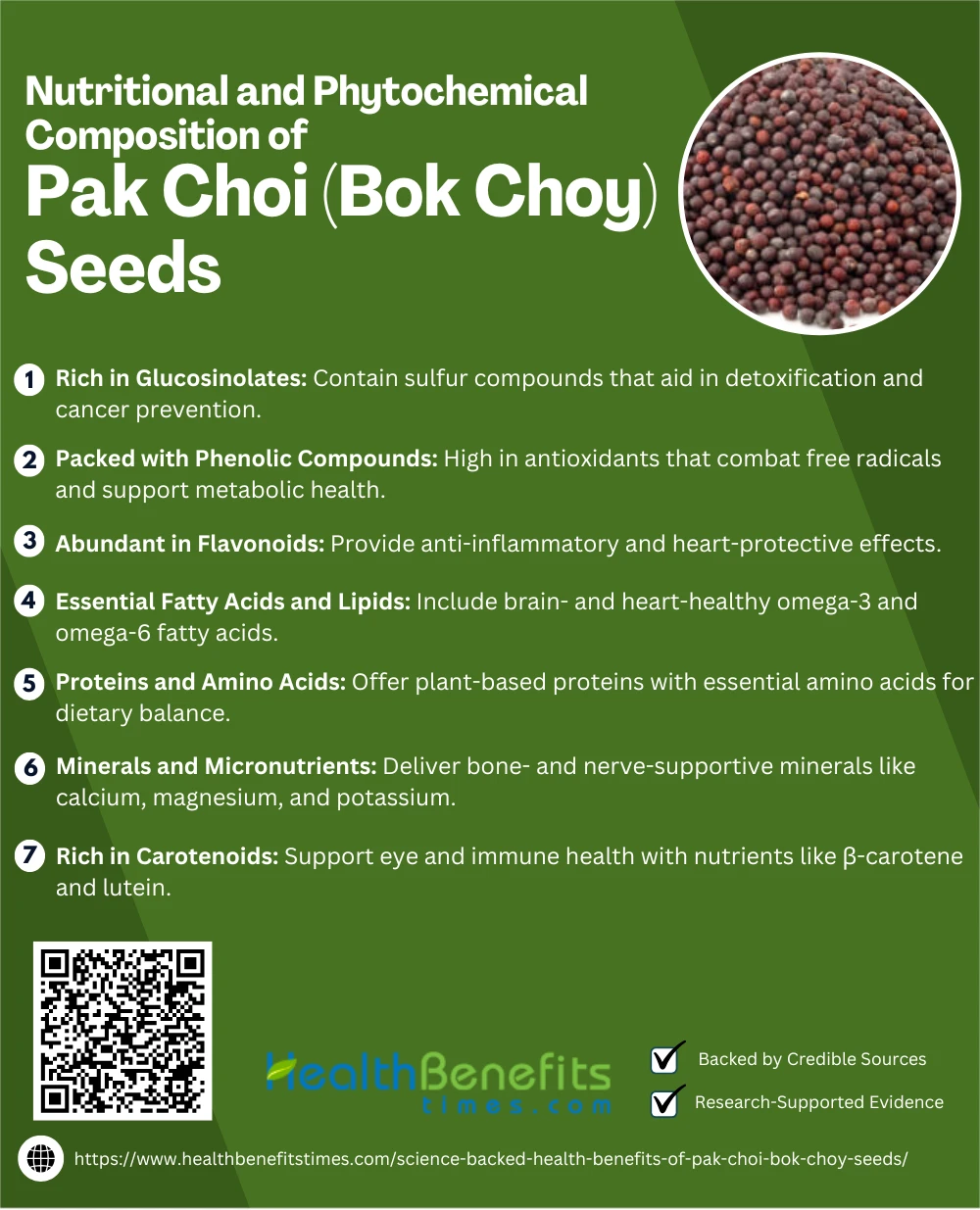- Pak Choi (Bok Choy) seeds are small, nutrient-dense seeds derived from the Brassica rapa vegetable, known for their potential health-promoting properties.
- Rich in antioxidants, omega-3 fatty acids, and phytochemicals, these seeds support anti-inflammatory and metabolic health benefits.
- Scientific studies suggest Pak Choi seeds may aid in reducing cognitive decline, improving digestion, and regulating blood sugar levels.
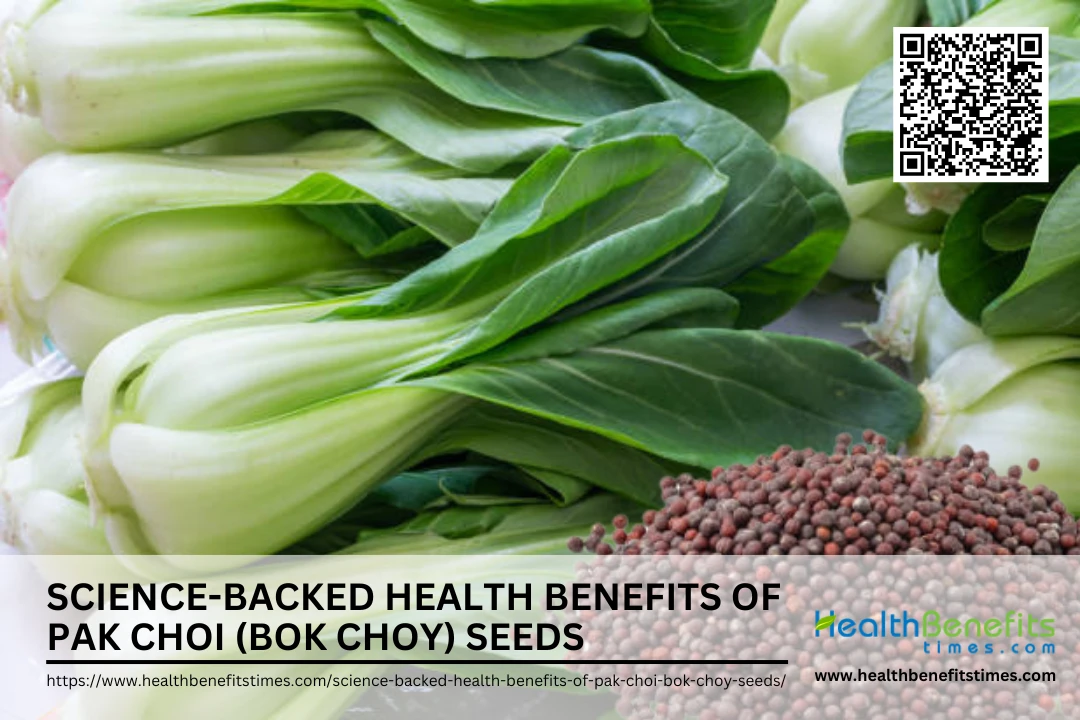 Pak Choi (Bok Choy) seeds are the reproductive kernels of Brassica rapa subsp. chinensis, a leafy cruciferous vegetable traditionally consumed in East Asia and now widely cultivated for both culinary and medicinal uses. As scientific exploration into plant-based bioactives expands, researchers are turning their attention not just to Pak Choi leaves but also to its seeds, which harbor a dense concentration of health-promoting phytochemicals. Emerging studies indicate that Pak Choi seeds are rich in glucosinolates, phenolic compounds, and essential fatty acids that may offer anti-inflammatory, antioxidant, and metabolic benefits. For instance, research has shown that glucosinolate variability in Pak Choi seeds can influence their chemoprotective potential, particularly in modulating cellular defense pathways and detoxification processes. Additionally, findings suggest that these seeds contribute to lipid metabolism regulation, offering promise in cardiovascular health management. A separate clinical study also highlighted that the combination of bioactives from Bok Choy seeds and dietary components like allicin synergistically improves gut health and mitigates colitis symptoms in animal models. Together, these studies underscore the untapped nutritional and therapeutic potential of Pak Choi seeds as a functional food.
Pak Choi (Bok Choy) seeds are the reproductive kernels of Brassica rapa subsp. chinensis, a leafy cruciferous vegetable traditionally consumed in East Asia and now widely cultivated for both culinary and medicinal uses. As scientific exploration into plant-based bioactives expands, researchers are turning their attention not just to Pak Choi leaves but also to its seeds, which harbor a dense concentration of health-promoting phytochemicals. Emerging studies indicate that Pak Choi seeds are rich in glucosinolates, phenolic compounds, and essential fatty acids that may offer anti-inflammatory, antioxidant, and metabolic benefits. For instance, research has shown that glucosinolate variability in Pak Choi seeds can influence their chemoprotective potential, particularly in modulating cellular defense pathways and detoxification processes. Additionally, findings suggest that these seeds contribute to lipid metabolism regulation, offering promise in cardiovascular health management. A separate clinical study also highlighted that the combination of bioactives from Bok Choy seeds and dietary components like allicin synergistically improves gut health and mitigates colitis symptoms in animal models. Together, these studies underscore the untapped nutritional and therapeutic potential of Pak Choi seeds as a functional food.
Nutritional and Phytochemical Composition of Pak Choi (Bok Choy) Seeds
Pak Choi (Bok Choy) seeds are rich in essential nutrients and bioactive compounds, including proteins, healthy fats, vitamins, minerals, glucosinolates, and antioxidants that contribute to their health-promoting potential.
Pak Choi seeds are a potent source of glucosinolates, sulfur-containing compounds known for their role in cancer prevention and detoxification. These phytochemicals are enzymatically converted into biologically active isothiocyanates, which have anti-carcinogenic properties. Research highlights high variability of these compounds across cultivars and their protective roles. (1) (2)
2. Packed with Phenolic Compounds
Phenolic acids such as ferulic acid and caffeic acid are abundant in Pak Choi seeds. These antioxidants help neutralize free radicals and may support metabolic health. Studies suggest their strong correlation with antioxidant capacity in Brassica species and detailed metabolomic profiling confirms this. (3) (4)
3. Abundant in Flavonoids
Flavonoids like kaempferol and quercetin are found in high concentrations in the seeds. These bioactives may aid cardiovascular health and offer anti-inflammatory effects. Studies identify Bok Choy as a reliable source of flavonoids among cruciferous vegetables. (5) (6)
4. Essential Fatty Acids and Lipids
Pak Choi seed oil contains linoleic and α-linolenic acids, vital for brain and heart function. Lipidomic analyses revealed diverse lipid classes and emphasized the nutritional value of seed oils in Brassica vegetables. (7) (8)
5. Proteins and Amino Acids
These seeds are a notable source of plant-based protein, providing essential amino acids like lysine and methionine. They offer potential as functional ingredients for plant-based diets. Research on seed composition across cultivars confirms protein variability. (9) (10)
6. Rich in Carotenoids
Carotenoids such as β-carotene and lutein present in Pak Choi seeds support eye health and immune function. A study comparing Brassica vegetables shows Pak Choi varieties rank high in carotenoid concentration. (11) (12)
7. Minerals and Micronutrients
Pak Choi seeds are densely packed with minerals including calcium, magnesium, and potassium—essential for bone and nerve health. These elements are more concentrated in seeds than leaves in some varieties. (4) (13)
Science-Backed Health Benefits of Pak Choi (Bok Choy) Seeds
Scientific research highlights the impressive health benefits of Pak Choi (Bok Choy) seeds, including anti-inflammatory, antioxidant, heart-protective, and immune-boosting properties, thanks to their rich phytochemical and nutrient profile.
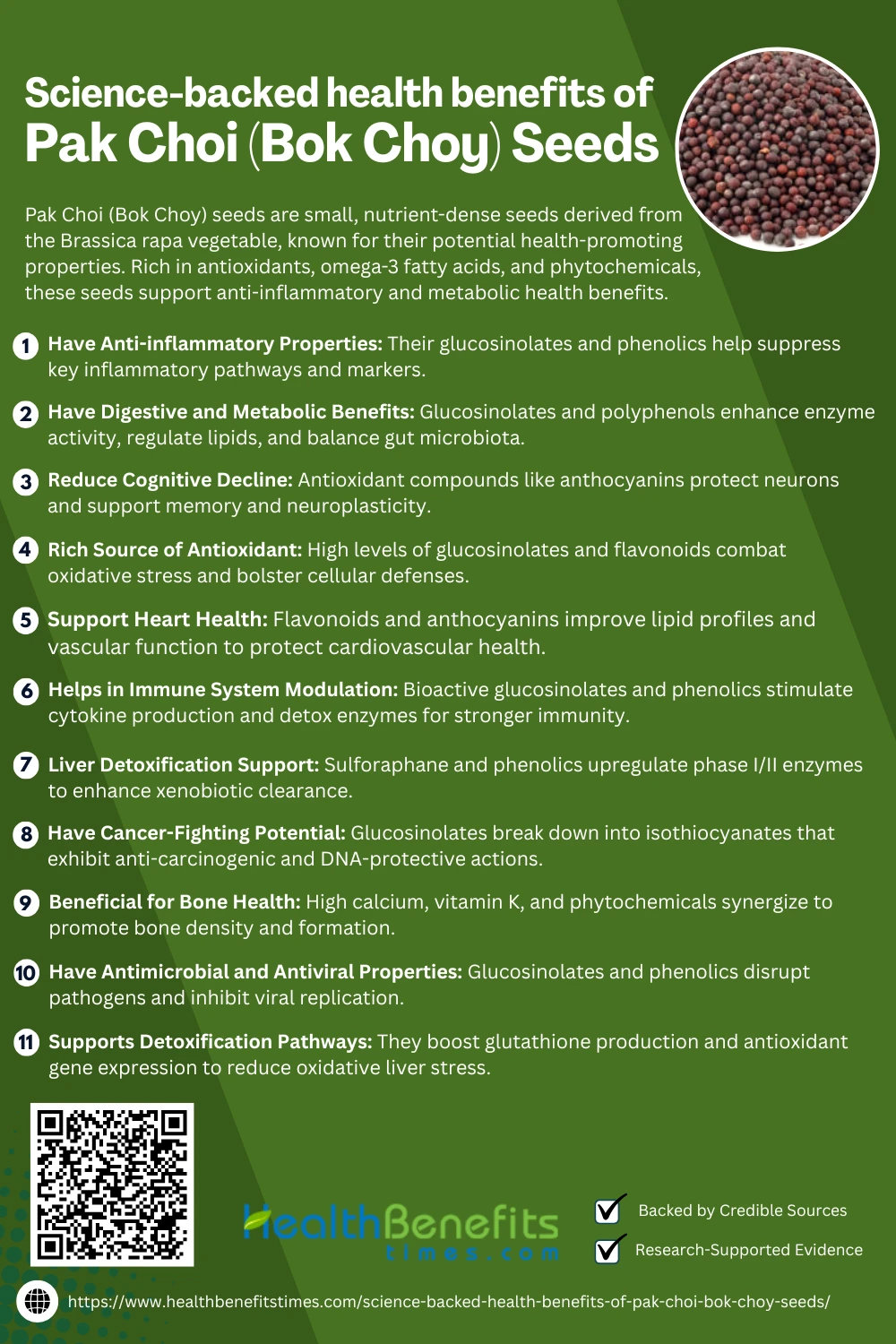 1. Have Anti-inflammatory Properties
1. Have Anti-inflammatory Properties
Pak Choi seeds are emerging as a functional food with strong anti-inflammatory effects due to their rich glucosinolate and phenolic content. These compounds modulate key inflammatory pathways such as NF-κB and cytokine expression. (1) (4) In animal models, seed extracts reduced colonic inflammation in colitis-induced mice. (14) Additional studies confirm significant suppression of inflammatory markers like TNF-α and IL-6. (15) (13)
2. Have Digestive and Metabolic Benefits
Pak Choi (Bok Choy) seeds are rich in glucosinolates and polyphenols, contributing to enhanced digestive enzyme activity and lipid metabolism regulation. These compounds stimulate bile secretion, supporting nutrient absorption and reducing metabolic disorders such as obesity and insulin resistance. (16) Studies confirm antioxidant effects that lower gut inflammation and optimize microbiota balance. (17) ({% trusted %}) Furthermore, glucoraphanin from Brassica seeds aids glucose control and reduces cholesterol synthesis. (3) (18)
3. Reduce cognitive decline
Emerging research suggests Pak Choi seeds may mitigate age-related cognitive decline through antioxidant-rich compounds like anthocyanins and glucosinolates, which reduce oxidative brain damage. (19) ({% trusted %}) These phytochemicals enhance memory and neuroplasticity by neutralizing free radicals. (20) Additionally, flavonoids in bok choy inhibit neuroinflammation and preserve acetylcholine levels, while MeJA-treated pak choi boosts antioxidant defenses. (21) (22) Their synergistic action has therapeutic potential for neurodegenerative conditions. (23)
4. Rich source of Antioxidant
Pak Choi seeds are an excellent source of antioxidants, notably glucosinolates and flavonoids, which combat oxidative stress and promote cellular defense. A study revealed that MeJA-treated pak choi significantly enhances antioxidant levels. (16) Similarly, metabolomic analysis identified high antioxidant activity in green and purple pak choi variants. (24) Preharvest strategies also improve their phytochemical content. (25) Furthermore, the presence of hydroxycinnamic acids in pak choi microgreens boosts antioxidant profiles. (26) These antioxidants mitigate aging and chronic disease risks. (6)
5. Support Heart Health
Pak Choi seeds contribute to cardiovascular well-being by modulating lipid metabolism and reducing inflammation. Anthocyanins from bok choy cultivars lowered hepatic fat and improved lipid profiles in high-fat-fed animals. (27) Flavonoids in bok choy also suppress cholesterol levels and enhance vascular function. (28) Targeted metabolomics identified key heart-protective compounds. (13) Further, UPLC-MS/MS revealed bioactives crucial for cardiac health. (4) This is supported by findings of enhanced glucosinolates in hydroponically grown varieties. (16)
6. Helps in Immune System Modulation
Pak Choi seeds are rich in bioactive glucosinolates and phenolic compounds known to influence immune modulation. Studies indicate that brassica vegetables like Bok Choy enhance immune response by stimulating cytokine production and activating detoxifying enzymes. (29) Bok Choy’s flavonols exhibit anti-inflammatory effects critical for immune defense. (30) Furthermore, selenium in Bok Choy supports immune cell regulation. (31) Studies on iron-stressed models confirm its immuno-nutritional potential, especially under oxidative stress conditions. (32) (33)
7. Liver Detoxification Support
Research shows that Bok Choy seeds enhance liver detoxification via upregulation of antioxidant pathways. Phenolic compounds and sulforaphane in Pak Choi boost phase I and II liver enzymes involved in xenobiotic clearance. (29) Selenium nanoparticles in Bok Choy reduce cadmium toxicity and improve hepatic antioxidant status. (34) Moreover, Bok Choy modulates lipid metabolism, mitigating fatty liver risk. (27) Glucosinolate-rich extracts also inhibit hepatocarcinogenesis and reduce oxidative liver stress. (35) (36)
8. Have Cancer-Fighting Potential
Pak Choi seeds exhibit notable anti-cancer potential due to their high glucosinolate content, which breaks down into biologically active compounds like sulforaphane, known for their anti-carcinogenic effects. A study on Brassica rapa demonstrated glucosinolate richness in Pak Choi varieties which inhibit tumor growth. (22) Additional evidence suggests that these seeds possess strong antioxidant activity and detoxifying properties, while the phenolic content further contributes to DNA protection. (30) (37) (5) Emerging reports also show flavonol profiles with antiproliferative activity in Bok Choy seed extracts. (4)
9. Beneficial for Bone Health
Pak Choi seeds support bone health through their exceptional levels of calcium, vitamin K, and bioactive phytochemicals. Research confirms that calcium and potassium in Pak Choi leaves and seeds significantly enhance bone density. (38) Another analysis highlights glucosinolate-mineral synergy aiding in bone formation. (7) Moreover, the high vitamin K content promotes osteocalcin regulation, while fatty acids in seed oils bolster skeletal strength. (39) (40) The holistic nutritional profile of Bok Choy was further validated in metabolic studies. (21)
10. Have Antimicrobial and Antiviral Properties
Pak Choi seeds exhibit promising antimicrobial and antiviral properties due to their high glucosinolate content and bioactive phenolics. These compounds disrupt microbial membranes and inhibit viral replication, making them effective against common pathogens. (29) Glucosinolates undergo enzymatic hydrolysis into isothiocyanates with broad antimicrobial activity. (41) Moreover, bok choy extracts have shown efficacy in modulating immune responses, supporting gut immunity, and inhibiting viral entry pathways. (22) (14) (18)
11. Supports Detoxification Pathways
Pak Choi seeds bolster detoxification through enhancement of liver enzyme activity and antioxidant pathways. These seeds are rich in glucosinolates that modulate phase I and II liver detox enzymes. (42) They promote glutathione production, a key antioxidant, and improve lipid metabolism via hepatic regulation. (43) (27) Pak choi also supports antioxidant gene expression and reduces oxidative liver stress. (44) (45)
How to Use Pak Choi Seeds in Your Diet
Incorporating Pak Choi seeds into your diet is easy and nutritious. They can be sprouted, roasted, blended into smoothies, or brewed into teas, enhancing meals with flavor and health benefits.
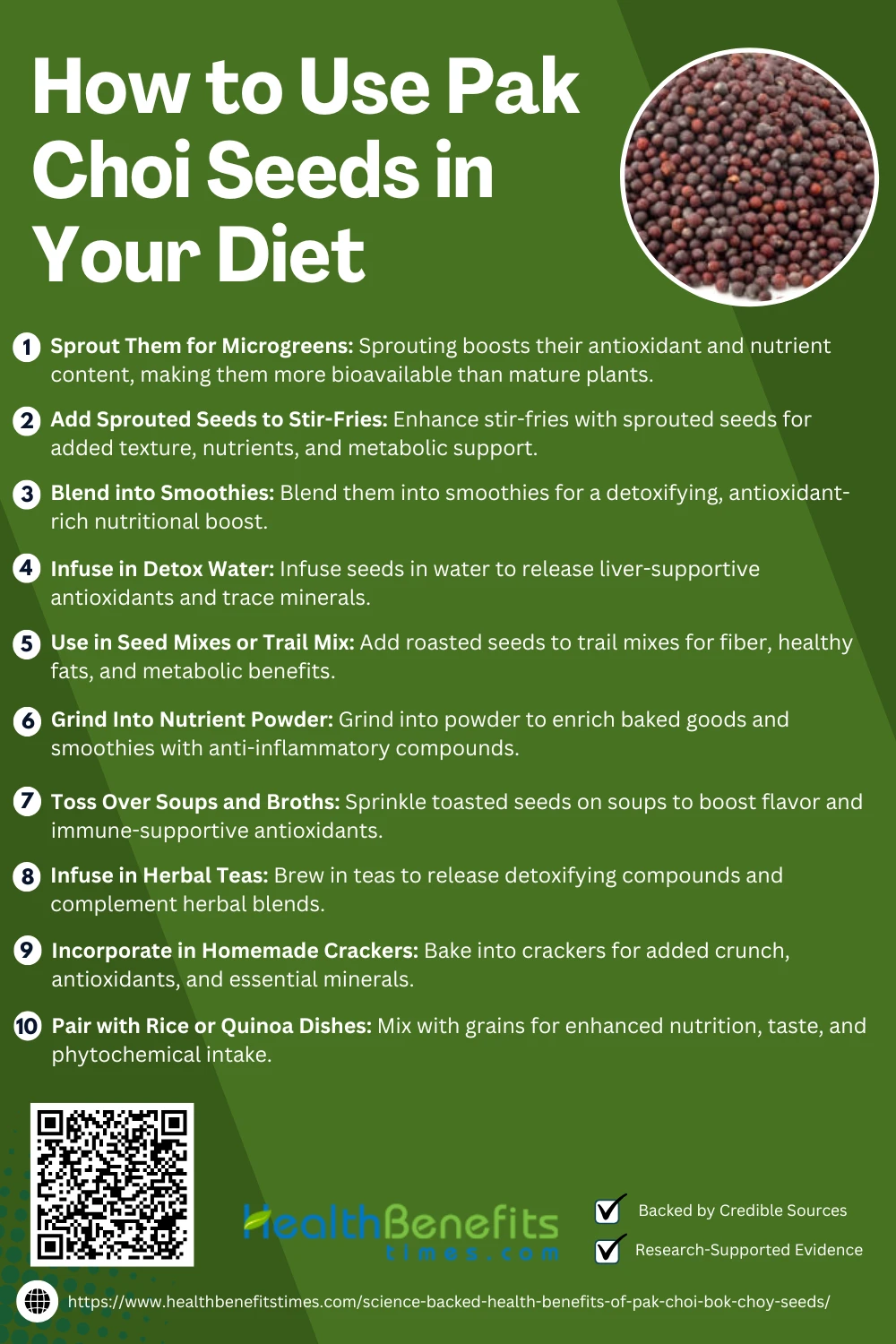 1. Sprout Them for Microgreens
1. Sprout Them for Microgreens
Sprouting Pak Choi seeds into microgreens boosts their nutritional value, providing high levels of antioxidants, minerals, and glucosinolates. These nutrient-dense greens show stronger health-promoting properties than mature plants. (46) Pak Choi microgreens enhance dietary diversity and display significant phytochemical concentrations with improved bioavailability. (47) (48)
2. Add Sprouted Seeds to Stir-Fries
Adding sprouted Pak Choi seeds to stir-fries enhances both texture and nutritional content. These sprouts retain high levels of bioactive compounds and antioxidants during light cooking. (49) Their glucosinolate-rich profile supports metabolic health, and their inclusion in cooked dishes helps retain essential vitamins. (47) (50)
3. Blend into Smoothies
Blending Pak Choi seeds into smoothies enriches them with antioxidants, glucosinolates, and fiber, enhancing their detox and anti-inflammatory effects. Cruciferous vegetables like bok choy are packed with cancer-protective phytochemicals. (51) Microgreens boost nutritional density in drinks, while Bok Choy’s nutrient diversity supports antioxidant capacity. (52) (48)
4. Infuse in Detox Water
Infusing Pak Choi seeds in detox water releases antioxidants, glucosinolates, and trace minerals into your drink. These bioactives aid liver function and oxidative stress defense. (17) Bok choy’s compounds activate phase II detox enzymes and enhance phytochemical intake, especially when combined with lemon or mint. (53) (54)
5. Use in Seed Mixes or Trail Mix
Pak Choi seeds can be roasted and added to seed mixes or trail snacks to enhance fiber, antioxidants, and essential fatty acids. Their nutrient-dense profile includes glucosinolates and minerals beneficial for metabolism. (55) The seeds also offer dietary diversification in tropical regions and have proven antioxidant value in metabolic profiling studies. (56) (57)
6. Grind Into Nutrient Powder
Ground Pak Choi seeds can be used as a nutrient powder in smoothies or baked goods, supplying bioactive flavonols, fiber, and glucosinolates. These components exhibit anti-inflammatory and anticancer effects. (30) Metabolite profiling confirms high phytochemical richness in seed forms. (57) Additionally, bok choy seed oils contribute healthy fats and functional nutrients. (40)
7. Toss Over Soups and Broths
Sprinkling toasted Pak Choi seeds over soups or broths enhances both flavor and antioxidant intake. These seeds are rich in flavonols and glucosinolates, which retain their potency when lightly heated. (5) Bok choy varieties are high in bioactive phenolics and provide essential nutrients for immune support, making them a functional topping. (39)
8. Infuse in Herbal Teas
Infusing Pak Choi seeds in herbal teas releases detoxifying glucosinolates and essential trace minerals. These compounds help activate phase II enzymes in liver detox pathways. (17) Glucoraphanin-rich extracts in Bok Choy aid antioxidant defenses and the seeds’ mild bitterness complements traditional herbs in cleansing brews. (54) (43)
9. Incorporate in Homemade Crackers
Incorporating toasted Pak Choi seeds into homemade crackers enhances flavor while delivering bioactive antioxidants and essential micronutrients like iron and zinc. These seeds have demonstrated potent functional food properties, particularly when integrated into crispy bases like crackers. (58) Their mild bitterness and texture pair well with wholegrain flours. (59) Moreover, germinated seeds retain high phytochemical content, supporting immune health. (60)
10. Pair with Rice or Quinoa Dishes
Pairing Bok Choy seeds with rice or quinoa elevates both taste and nutrition, offering a boost of antioxidants and fiber. These microgreens enrich meals with iron and carotenoids critical to metabolic wellness. (61) When mixed with grains, they also enhance umami and texture. (62) Sprouted forms show even higher bioactivity and culinary compatibility. (48)
Potential Side Effects of Pak Choi Seeds
While Pak Choi seeds offer health benefits, potential side effects include thyroid interference due to goitrogens, digestive discomfort in sensitive individuals, and possible interactions with medications or allergic reactions.
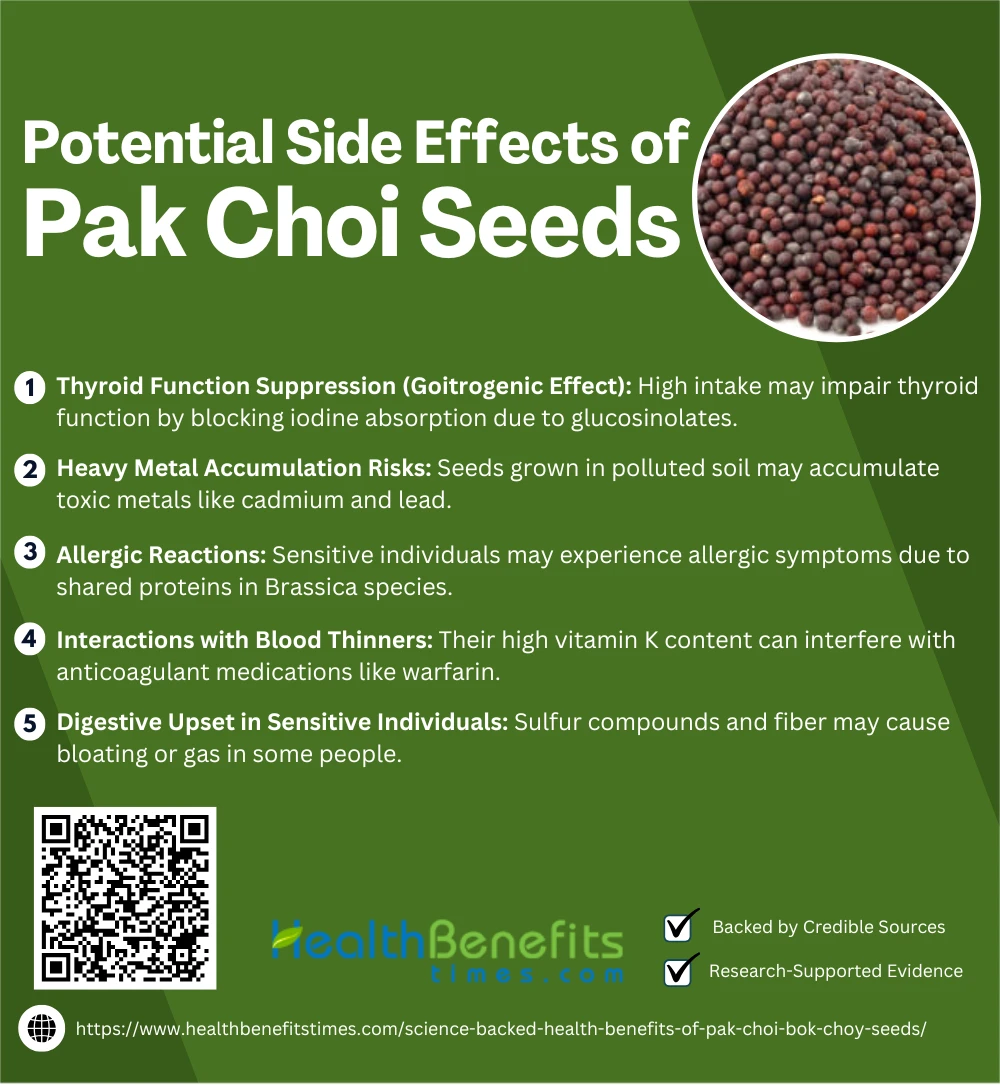 1. Thyroid Function Suppression (Goitrogenic Effect)
1. Thyroid Function Suppression (Goitrogenic Effect)
Bok Choy seeds contain glucosinolates, compounds that can inhibit iodine absorption, possibly impairing thyroid function. Excessive intake has been linked to goitrogenic effects. (22) Consumption without adequate iodine may suppress T3 and T4 levels. (1) This risk is especially relevant for individuals with pre-existing thyroid issues.
2. Heavy Metal Accumulation Risks
Bok Choy seeds can accumulate heavy metals like cadmium and lead if grown in contaminated soil, posing potential toxicity risks. (63) Studies show high uptake of metals by Brassica crops in polluted regions, raising safety concerns for unscreened seeds. (64) (65)
3. Allergic Reactions
Pak Choi seeds may trigger allergic responses in sensitive individuals due to shared proteins with other Brassica species. Symptoms range from oral itching to gastrointestinal discomfort. (66) Brassica seeds contain vicilin-like storage proteins, known allergens. (67) Immune cross-reactivity within Brassicaceae increases hypersensitivity risks. (68)
4. Interactions with Blood Thinners
Pak Choi seeds are rich in vitamin K, which may interfere with anticoagulant medications such as warfarin. Elevated intake may alter coagulation times in susceptible individuals. (22) Leafy Brassica vegetables, including bok choy, can significantly affect INR levels. (17) Caution is advised for patients on blood-thinning therapy. (64)
5. Digestive Upset in Sensitive Individuals
Some individuals may experience digestive discomfort from Bok Choy seeds due to their sulfur compounds and high fiber content, which can lead to bloating or gas. Sulfur-rich thiols and glucosinolates present in Brassica vegetables are known to cause gastrointestinal irritation. (69) Additionally, cooking or fermentation may reduce such effects. (70)
Conclusion
Pak Choi (Bok Choy) seeds stand out as a nutrient-dense and phytochemical-rich addition to a healthy diet. Scientific studies support their anti-inflammatory, antioxidant, heart-supportive, immune-boosting, and detoxifying properties, largely due to compounds like glucosinolates and flavonoids. When consumed appropriately, these seeds may contribute to long-term wellness and disease prevention. However, it’s important to be mindful of potential side effects, especially for individuals with thyroid conditions or food sensitivities. By incorporating Pak Choi seeds in various culinary ways, such as sprouting or roasting, you can enjoy both their flavor and scientifically supported health benefits as part of a balanced lifestyle.


